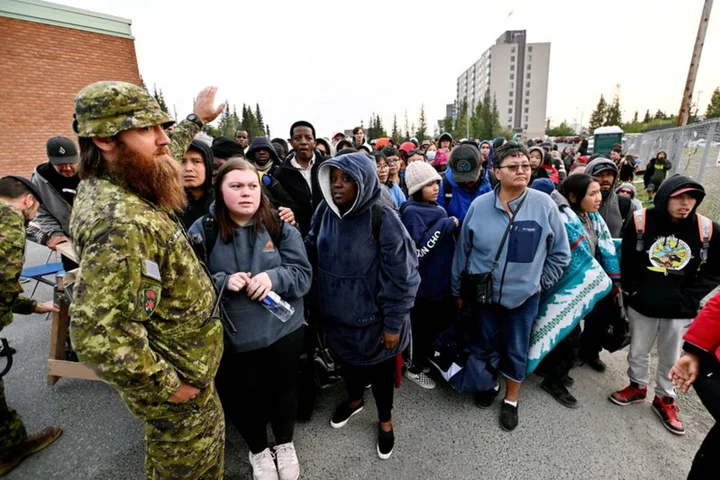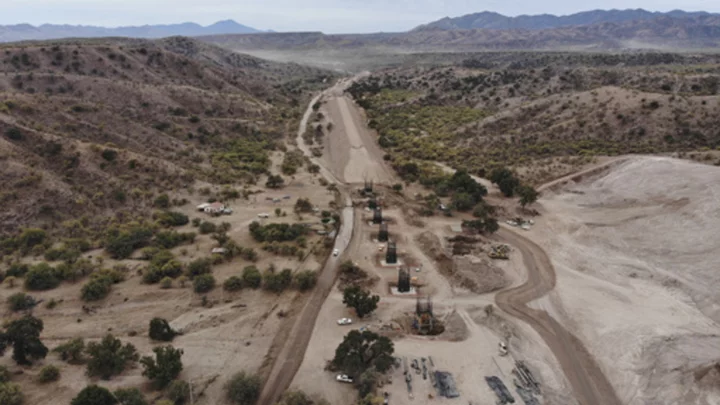By Jennifer Gauthier, Timon Johnson
YELLOWKNIFE, Northwest Territories/EDMONTON (Reuters) -The remaining residents from the remote northern Canadian city of Yellowknife sought to get out of town on Friday before flames blocked their exit, while another wildfire in the western province of British Columbia prompted new evacuation orders.
A state of emergency was declared early on Friday in and around Kelowna, a city some 300 kilometres (180 miles) east of Vancouver with a population of about 150,000. Officials said the next 24 to 48 hours could be the most difficult. The airspace was closed to clear the way for water bombers.
Some of the hills around the city blazed in the predawn light after wildfires that had been burning since Tuesday jumped Lake Okanagan and spread into parts of Kelowna.
"We fought hard last night to protect our community," Jason Brolund, West Kelowna fire chief, told reporters. "Night turned to day because of the orange glow of the clouds and the fire."
More than 2,400 properties were evacuated, officials said, and thousands more are on alert to leave with little notice if necessary. Several structures were destroyed in West Kelowna during the night, he said.
"Today is going to be a challenging day again. The winds are stronger than they were yesterday," Brolund said. "People are going to see that glow again" Friday night, "and it's going to look worse than you ever expected," he added.
The expanse of fires and disruption to life and land underscore the severity of this year's worst-on-record Canadian wildfire season, with more than 1,000 active fires burning across the country.
Some 1,425 km (885 miles) to the northeast, the massive blaze threatening Yellowknife, the Northwest Territories' capital city, made little progress on Friday, the territorial fire service said, because of successful firefighting.
However, strong winds forecast for Friday and Saturday are still blowing the blaze toward the city, and it could reach the outskirts by the weekend. "Critical, challenging days" lie ahead, the fire service said.
The fire is about 15 km (9 miles) northwest of the city and the smell of smoke in Yellowknife is pervasive. Fires have been burning on either side of the only highway out of town, which remained open.
"It is on fire on both sides of the road ... it's a very surreal experience," said Brent Saulnier, who had been visiting.
Many still must leave the city of around 20,000, with the evacuation deadline set at noon local time (1800 GMT).
"The noon deadline doesn't mean that the highway closes at noon," Yellowknife Mayor Rebecca Alty said in an interview with the Canadian Broadcasting Corp. "We're just really encouraging folks to go as soon as possible. The highway will continue to be open as long as it's safe."
Flights will also continue after the deadline, Alty said.
Calgary, Alberta, received 15 evacuee flights from the Northwest Territories on Thursday and was expecting an additional 26 flights on Friday carrying approximately 2,300 people, the city said. The Canadian military flew out 79 people on Thursday and has more flights scheduled for Friday.
Around 65% of the 46,000 total population of Northwest Territories looked set to be evacuated.
Firefighting teams were cutting down vegetation to create fire breaks, setting up sprinkler systems and setting deliberate fires to eliminate fuel before the bigger blaze approaches, the fire service said.
DRY CONDITIONS
Experts say climate change has exacerbated the wildfire problem. Drought and high temperatures have contributed to the number and intensity of this year's fires, officials say. Much of Canada has seen abnormally dry conditions.
Responding to complaints that Facebook parent company Meta Platform's blocking of vital news about the fires amid a dispute with the federal government over a law demanding income-sharing with local media, Transport Minister Pablo Rodriguez on Friday urged Meta to allow news to be shared.
As the number of evacuees in Grande Prairie and St. Albert, on the northern outskirts of Edmonton, increased, both cities announced their centers reached their full capacities and redirected all arriving evacuees to a new center in Leduc south of the provincial capital of Edmonton.
Among them was the Gour family from the town of Hay River.
When they received an alert on their phones while camping out, the family was left uncertain about where their son, Liam, 13, was going to land as he was returning from a cadet trip in the neighboring territory of Yukon.
As the family made their way toward Alberta, what mattered most to Paula Gour was her family.
"The only thing that I had in mind was that I had the kids, the dogs, and we had each other and just to get out of there. That's all you can really think about at that time," she said.
(Additional reporting by Dan Whitcomb and Timon Johnson; Reporting by David Ljunggren, Ismail Shakil, and Steve Scherer in Ottawa; Writing by Denny Thomas, David Ljunggren and Steve Scherer; Editing by Sharon Singleton, Chizu Nomiyama, Jonathan Oatis and Josie Kao)









